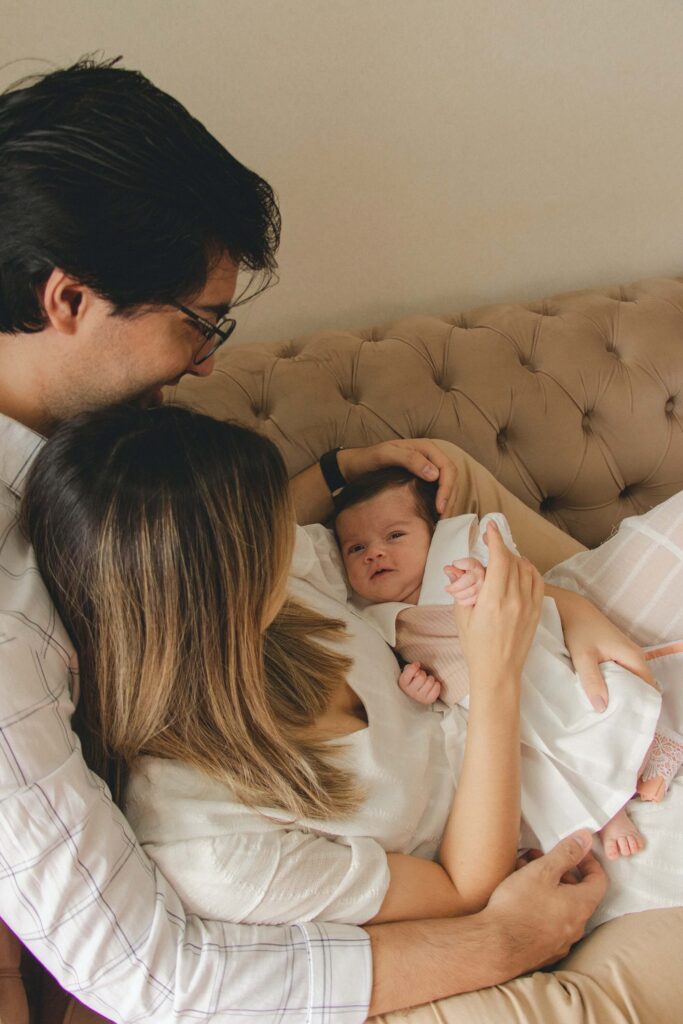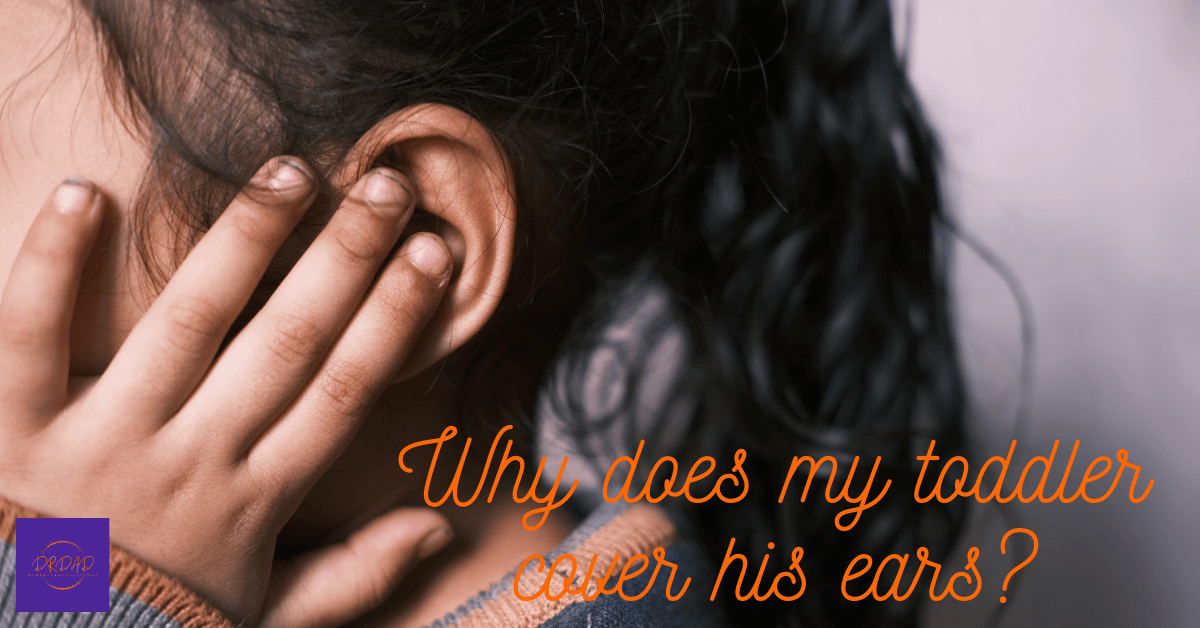Most of the time toddlers cover their ears for self-soothing. The simplest answer for, why does my toddler cover his ears? So It is more common among them. Toddlers cover their ears when they are overwhelmed, overstimulated or when loud noises are present.
Sometimes they do this behavior when they are embarrassed or scared. Some toddlers cover their whole heads by covering their ears when they are anxious or angry.
It is a kind of self-preservation behavior. They feel safer in this specific behavior pattern. But if a toddler shows this behavior together with other behaviors or physical symptoms, it should be more concern than this.
In the case of ear infections, toddlers show another set of symptoms while covering their ears. They show irritability, balance issues, and sleep problems or fever.
It is nothing to worry much to see that your toddler covers his ears with his fingers. Little kids frequently do this when overly stimulated by various noises and sounds.
Covering the toddler’s ears is a strong physical cue that presents as a response to a scared or tense expression. Sometimes it tells you that they have a problem.
Such dear parents. try to read the physical cues of your baby correctly. That will tell you a variety of details about your kids.
What does it mean when a kid covers their ears?
At first instance, you think that your toddler covers his ears for no reason. After that, you can identify the kids covering their ears for the purpose of self-soothing rather than sheer defiance.
It is very common in toddlers to cover their ears when they are overwhelmed, sensitive to loud sounds, overstimulated, etc.
Some categories try to cover their whole head with a blanket-like thing when they are anxious or scared. It can be named self-preservation behavior.
They seek more safe in that position. But if the parents observe a few physical symptoms together with ear-covering behavior, that is the place you need to pay much attention to.
Sometimes this may be a sign of pain inside the kid’s ear. Mostly the children are more likely to cover or pull their sore ears. So it is better to check if they are having ear infections or other pain.
Normally kids hear better than adults. So it is generally not abnormal for them to show over-sensitivity to the sound. But parents need to observe them closely.
Should I be concerned about my kid covering his ears?
Dear parents, I suggest you need to pay close attention to this issue. If your child is covering his ears from a behavioral standpoint, it is very important to address this.
So I advise parents to keep a log of their kids daily and write down what they see daily when they see their daily activities.
This log-keeping is helping your pediatrician understand the background details regarding the issue. Few types of research show that child covering their ears and showing various auditory sensitivities is a sign of autism spectrum.
I have noticed that many children have various auditory sensitivities such as baby crying, engine sounds, toilet flushing sounds, and many more auditory sounds.
So these kids use covering the ear as one way of reducing the sound frequency by them. An experienced Occupational therapist should address these sensory issues to rule out the actual problem of the child.
What causes toddlers to cover their ears with both hands
There are many factors for toddlers to cover their ears mostly with both hands. Sometimes it can indicate a wide range of conditions right from hearing sensitivity, and sensory processing difficulty to early signs of autism.
Sensitivity to sound – Oversensitivity
Most of the time parents think this is some kind of a hearing problem. They are unable to rule out the cause behind the toddler’s behavior.
Some toddlers are naturally sensitive to sound and they are easily irritated and get upset. So they always try to avoid the slightest stimuli. They try to run away from the stimuli or show another natural reaction.
Parents need to give their toddlers some time to their toddlers to calm down as soon as they cover their ears. So never try to immediately make them remove their hands from their ears.
So it is not unusual for kids to be sensitive to unexpected noises or loud sounds. It can affect persons of all ages but is most common in young adults.
Dear parents, This is not always a sign of a sensory processing illness. Sound sensitivity is normal in most kids up to certain age.
The avoiding mechanisms for loud sounds differ from toddler to toddler. Some kids cover their ears using both hands. Others cry or make a little fuss.
Some bury their faces into an adult’s lap to avoid the sound reaching their ears. All these signs are sound sensitivity signs. These signs help them to pass the time while adjusting to the various sound stimuli.
The sounds like fireworks, bells, vacuum cleaners, traffic noise, children screening, sirens, and alarms find more troublesome with the kids.
A sign of autism
Most parents have a big worry that the sound sensitivity of their kids leads to autism spectrum disorder. This is true up to a certain extent. But not always and sound sensitivity is a rear symptom of autism.
According to the research, up to 30%-90% of artistic kids responds with overreaction to the sounds. Also, they have a problem with ordinary sights, smells, or other sensations such as tactile, vestibular, or joint problems.
Also try to identify the other symptoms such as the inability to socialize, make direct eye contact, and feeling anxious n public places. If your child accompanies by the above symptoms by covering their ears in loud noises, it may be early signs of autism.
if you notice your kid is highly sensitive to sound, it is better to go to the pediatric specialist to get professional advice.
Tinnitus
Sometimes kids are taking the illusion of constant sound as a result of repeated ringing sensations in their ears. It is a condition called tinnitus. Sometimes it can happen with adults as well.
Sometimes this may be the reason for the unexpected behavior of your kid. These kids could feel the irritable sensation try covering their ears with both hands.
Parents need to regularly observe their kids and see how they respond and convey in the form of cues and gestures.
Also, continuous long-term tinnitus can be harmful to your kid. It will cause for learning and normal life of kids as well.
Fear
Your toddler doesn’t know how the world works and what are the things around them at first. So it is very common for them to suffer from unknown fear and anxiety.
So covering ears can be the simplest form of preventing unpleasant things happen to them. This can commonly happen in crowdy places mostly.
So dear parents, it is very much important for you to assure your kid in such situations and try to calm down your kid.

How to help your kid with sound sensitivity
The best option you can do is to move your kid away from the sound source. After that, you can comfort and reassure them. Never overreact to their response. Then they try to get this experience’s sake of attention the next time.
Parents need to explain calmly about the sound source by sitting with them. That will help them to understand that there is nothing to fear.
You can repeat the gentle exposure of the sound sources. That will help them to reduce their anxiety. It will gradually desensitize the sensitivity of the kid.
Also, parents can provide kids with some practice listening to various sounds during their play activities. That will break their fear.
Never let your kid be forced to stay near a sound source that is causing them distress. If so kids make them associate that specific situation with a newly built painful experience.
Always try to avoid silence with your baby. That will worsen their sound sensitivity. In extreme cases, your pediatrician may recommend sensory integration therapy.
TIll proper sensory integration, you can use earplugs in extreme circumstances. Always think about the normal and tolerable sounds for the brain and the ear of your kid.
Be careful about prolonged ear defender usage and that will increase the sound sensitivity.
Conclusion
There is no medical treatment required for sound sensitivity mostly. kids are growing day by day and their sensory organs are developing with time.
So their sensory integration is improving with time. Try to gradually expose your kid to loud noises and sounds.
Be patient until the improvement of their tolerance to loud noises. According to this article, I emphasize that kids cover their ears by using both hands for sensory soothing purposes mainly.
Parents need to reassure kids when they hear loud sounds and try to give them the opportunity to adapt to the noises gradually. Also, parents need to think and pay attention to medical conditions such as autism and related disorders where autistic kids have problems in integrate the hearing sensation.


I do agree with all the ideas you have introduced on your post They are very convincing and will definitely work Still the posts are very short for newbies May just you please prolong them a little from subsequent time Thank you for the post